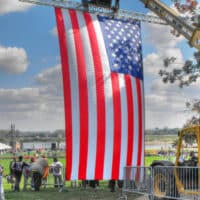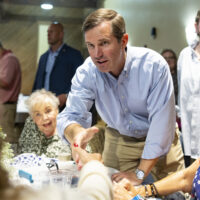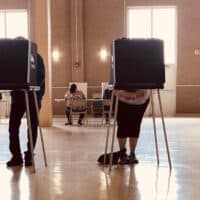Another election cycle has come and gone and the U.S. has witnessed peaceful transitions of power all over the nation at various levels of government.
It must be said that this is an off-cycle election and the real test will come with the 2024 election. But for the time being, we should all express a heartfelt sense of gratitude that election results across the country at the federal level and in every state, county, city, village and hamlet were for the most part accepted peacefully.
At this point in our nation’s history, anytime we have a peaceful transition of power it is a win for democracy and the rule of law.
History repeating itself
But even with relative peace for the moment in our land, one cannot help but notice a steady tension, sharp disagreement, and even increased violence stemming from competing political ideologies. It may seem alarming and out of the ordinary but it is more common than one may realize.
Unfortunately, political violence is nothing new. Historical examples are plentiful, including the French Revolution, Nazism, the American Civil War, racial violence after reconstruction, the September 11 attacks and most recently, the January 6 attack on the United State Capitol. All of these were examples of individuals resorting to violence because of disagreements and people arriving at the conclusion that differences could not be resolved at the discussion table. Some of these might be considered just causes and others may amount to global and domestic terrorism.
With the rise of a new — but somewhat familiar in history — iteration of populism we see hints of a type of extremism stemming from people’s inability to handle political disagreements or cope with the fact that others may not see things from their point of view. One particularly alarming example that may be akin to what we have seen at political rallies in recent times is in 1856 the pro-slavery South Carolina Congressman Preston Brooks went into the Senate armed with a cane and used it as a weapon to nearly beat Massachusetts Senator Charles Sumner, a staunch abolitionist, to death.
Although we are shocked by these historical examples, it seems there is an unfortunate return to a violent political past in America and in our world at large. We only have to turn to the atrocities going on in the middle east to see how political disagreement and ethnic conflict can manifest itself in frightening ways.
Internationally, social media timelines have featured unthinkable footage of the conflict in Israel showing civilian and military deaths that is difficult to unsee. In the United States, over the past few years, news has been full of protesters arguing, getting into fist fights, using clubs and sticks and wielding assault rifles to attack protesters.
On another level of violence, we see a disturbing increase of people resorting to racially and ethnically motivated mass murder in the U.S because the perpetrators adhere to a white supremacist political ideology.
Open civil dialogue is key to a successful democracy
In a democratic society it is very important that people get to share their voice and that they feel comfortable coming to the table to discuss any subject. However, if certain parameters and guidelines of civility are not in place it can be very difficult to have a meaningful conversation. One cannot listen or be heard when individuals from both sides of a particular debate are talking past one another.
In this way, citizen’s may struggle with sharing their true feelings if they fear that they will suffer consequences as a result of voicing their opinion. One only has to examine political discussions on social media to see how quickly civility breaks down when someone puts forth an opinion contrary to that political echo chamber. As a chilling example, a local writer and columnist expressed under anonymity that they have even gotten racist threats of violence and even death on social media for expressing certain views around diversity, equity and inclusion.
Because of incidents such as this, rather than talking things out, conversations and situations escalate to violent levels making people reluctant to share true feelings. This is a phenomenon that can lead to the breakdown of a true democracy and make way for a totalitarian or tyrannical form of government or can even result in a society led by mob rule.
Lack of tolerance for opposing views
The concern in the United States today is people’s seeming lack of ability to have any tolerance for opposing socio-political views. It behooves us to try to be more open minded and tolerant of other peoples’ views and those that disagree with us. It does not mean that one has to agree with opposing arguments but simply listening and understanding the other’s points of views can go a long way towards restoring decency in our world. Further, thoroughly understanding an opposing view can help us solidify our position, or even better, it can help us find ways to reach across the political aisle towards bipartisanship.
There is an increasing need for people to have the ability to have a civil discourse and conversation and not lose one’s temper when someone disagrees with them. The country is divided in many ways. This is ironic because some of the core values of the American democratic society are unity, tolerance, justice, freedom and diversity.
America has been known as the melting pot, where individuals from various cultural, racial, political and social backgrounds can co-exist. Scholars have even moved from the metaphor of the melting pot to the salad bowl. With the salad bowl, people do not sacrifice their identity to adopt Euro-American middle-class values, instead, they hold on to their cultural background but at the same time embrace what it means to be American.
There are growing divisions in U.S. society along many ideological and social lines, these divisions often stem from debates between democrats and republicans, European Americans, and people of color, rich and poor, along religious lines and many more. But a true democratic society is designed to facilitate discussion and dialogue and shared governance between people from diverse backgrounds.
Start with the youth
Some of these conversations can start in classrooms across the country. Schools are a great place to teach students the idea of civility. Social studies teachers often have very strong political and sociological views, but should be the first line of defense in demonstrating to students how to be civil.
Teachers can set up scenarios where students learn to discuss or debate controversial topics without being disrespectful or worse, becoming enraged and acting upon those emotions.
Beyond status quo
I will conclude by saying that this is not a call for a “go along, to get along” kind of strategy whereby people do not share their true thoughts in an effort to maintain a sort of false peaceful status-quo. Voices are silenced in this scenario and often only the loudest, most privileged, and strongest voices are heard under the guise of inclusiveness.
A democracy is messy, people are going to disagree, and working solutions are often going to be tough to arrive at. Tempers will flare, feelings will be hurt and misunderstandings will occur, but as a nation we have to learn how to resolve our differences better or we may find ourselves repeating parts of our nation’s violent past.
This is an opportune time to remember the wisdom of philosopher Friedrich Nietzsche when he said “Those who forget their history are destined to repeat it.”
Dr. David Childs, Doctor of Divinity and Ph.D. is associate professor of Social Studies, History and Black Studies and director of the Black Studies program at Northern Kentucky University.






